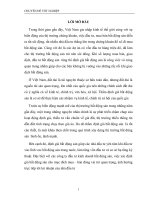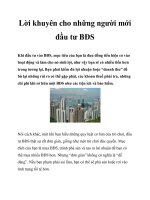tiếng Tây Ban cho người mới bắt đầu
Bạn đang xem bản rút gọn của tài liệu. Xem và tải ngay bản đầy đủ của tài liệu tại đây (6.71 MB, 296 trang )
SpanishPod101.com
Learn Spanish with FREE Podcasts
Newbie
Hi! How are You?
1
Spanish
English
Vocabulary
Grammar Points
Cultural Insight
2
2
2
3
4
SpanishPod101.com
Learn Spanish with FREE Podcasts
Spanish
BEATRIZ
JOSÉ
BEATRIZ
JOSÉ
BEATRIZ
¡Hola!
¡Hola! Buenos días.
¿Cómo estás?
Yo estoy bien. ¿Y tú?
Yo estoy muy bien. Gracias.
English
BEATRIZ
JOSÉ
BEATRIZ
JOSÉ
BEATRIZ
Hi.
Hi. Good morning.
How are you?
I am well. And you?
I am very well. Thanks.
Spanish
2
BEATRIZ
JOSÉ
BEATRIZ
JOSÉ
BEATRIZ
¡Hola!
¡Hola! Buenos días.
¿Cómo está?
Yo estoy bien. ¿Y usted?
Yo estoy muy bien. Gracias.
English
BEATRIZ
JOSÉ
BEATRIZ
JOSÉ
BEATRIZ
Hello.
Hello. Good morning.
How are you, Sir?
I am well. And you, Ma'am?
I am very well. Thanks.
Vocabulary
LC: 001_NB1_121707 © www.SpanishPod101.com - All Rights Reserved 2007-12-17
SpanishPod101.com
Learn Spanish with FREE Podcasts
Spanish
hola
bueno
el día
cómo
estar
yo
tú
gracias
English
hello, hi
good
day
how
to be
I
you
thanks, thank you
Class
verb
adjective
noun
interrogative adverb
verb
personal pronoun
personal pronoun
exclamation
Vocabulary Sample Sentences
Hola, ¿cómo esta ud?
Buenos días.
Es un día bonito.
¿Cómo se llama usted?
Están bien.
Yo estoy feliz.
Tú hablas bien.
Gracias por venir.
3
"Hi, how are you?" (formal)
"Good morning."
"It's a nice day."
"What's your name?" (formal)
"They are fine."
"I am happy."
You speak well.
"Thank you for coming."
Grammar Points
The verb "estar" means 'to be'. It is used all the time in the Spanish language, so it is a good idea to
learn it right from the beginning. Whenever we learn a verb, we always will study it in the First
Person, Second Person and Third Person. And we will also study it in the Singular and the Plural.
Today, we're going to look at the First, Second and Third Persons in the Singular.
First Person Singular: "yo estoy" ( I am)
Second Person Singular: "tú estás" (you are, informally)
Third Person Singular: "él está" (he is), "ella está" (she is), "usted está" (you are, formal), and "está"
(it is, impersonal).
When we break down a verb in this way, we call it a conjugation. We will learn more about the
conjugations in future lessons. Today, we have learned the First, Second and Third persons for the
Singular conjugation of the Present Tense in the Indicative Mood.
LC: 001_NB1_121707 © www.SpanishPod101.com - All Rights Reserved 2007-12-17
SpanishPod101.com
Learn Spanish with FREE Podcasts
Cultural Insight
Spanish is a language that stretches across the globe. Originating in Spain, from the Castilian dialect
of Vulgar Latin, it is today the official language of 20 countries. In Central America, there is Costa
Rica, Cuba, the Dominican Republic, El Salvador, Guatemala, Honduras, Mexico, Nicaragua, Panama
and Puerto Rico. In South America, it is spoken in Argentina, Bolivia, Chile, Colombia, Ecuador,
Paraguay, Peru, Uruguay and Venezuela. In Africa, it is the official language of Equatorial Guinea. In
addition to these, it is spoken a great deal in Canada, Morocco, the Philippines, and the United States.
4
LC: 001_NB1_121707 © www.SpanishPod101.com - All Rights Reserved 2007-12-17
Powered by TCPDF (www.tcpdf.org)
SpanishPod101.com
Learn Spanish with FREE Podcasts
Newbie
How are you all?
2
Spanish
English
Vocabulary
Grammar Points
Cultural Insight
2
2
2
3
3
SpanishPod101.com
Learn Spanish with FREE Podcasts
Spanish
JOSÉ
BEATRIZ
JOSÉ
BEATRIZ
JOSÉ
¿Cómo están Claudia y usted?
Nosotras estamos bien.
¿Y cómo están Cristina y Javier?
Ellos están bien también.
¡Qué bueno!
English
JOSÉ
BEATRIZ
JOSÉ
BEATRIZ
JOSÉ
How are you, Ma\\'am, and Claudia?
We are well.
And how are Cristina and Javier?
They are well too.
Great!
Spanish
2
JOSÉ
BEATRIZ
JOSÉ
BEATRIZ
JOSÉ
¿Cómo están Claudia y tú?
Nosotras estamos bien.
¿Y cómo están Cristina y Javier?
Ellos también están bien.
¡Qué bueno!
English
JOSÉ
BEATRIZ
JOSÉ
BEATRIZ
JOSÉ
How are you and Claudia?
We are well.
And how are Cristina and Javier?
They are well too.
Great!
Vocabulary
LC: 009_NB2_122407 © www.SpanishPod101.com - All Rights Reserved 2007-12-24
SpanishPod101.com
Learn Spanish with FREE Podcasts
Spanish
y
nosotros, -as
bien
también
¡qué bueno!
English
and
we
well
also, as well, too
Great! How Great!
Class
coordinating conjunction
personal pronoun
adverb
adverb
exclamation
Vocabulary Sample Sentences
Tú y yo somos amigos.
Nosotros estamos presentes.
Hablas bien.
Hablo español también.
¡Qué bueno verte!
You and I are friends.
We are present.
You speak well.
"I speak Spanish as well."
How great to see you!
Grammar Points
3
The verb "estar" means "to be". Last lesson, we looked at "I am", "you are", "(s)he is". These are
called the First, Second and Third Person Singular, conjugated in the Present Tense of the Indicative
Mood. Today, we will look at the corresponding plural forms.
First Person Plural: "nosotros estamos." (We are.)
Second Person Plural: "vosotros estáis" (You all are, informal.)
Third Person Plural: "ellos están" (they are, masculine)
Third Person Plural: "ellas están" (they are, feminine)
Third Person Plural: "ustedes están" (you all are, formal)
In Latin America, the form, "ustedes están", takes the places of "vosotros estáis". So there, the formal
and informal second person plural is always "ustedes están". Again, this is only so in Latin America.
In Spain, the second person plural, "vosotros", is reserved for informal forms of address; and the third
person plural, "ustedes", for formal.
Cultural Insight
In Spanish, there are "formal" and "informal" ways of saying things. This happens quite a lot in
LC: 009_NB2_122407 © www.SpanishPod101.com - All Rights Reserved 2007-12-24
SpanishPod101.com
Learn Spanish with FREE Podcasts
speaking to other people. There is the formal way of saying "You" ("usted"), and there is the informal
way: "tú". Both of them mean "you", but the formal way shows respect for the person being spoken
to, and the informal way shows confidence in the person being spoken to. The form of address,
"usted", is used in business, with acquaintances and with people older than we are. In general, it's used
with people whom we don't know well or whom we want to treat with noticeable respect. The form of
address, "tú", is used with friends, with people to whom you need not show respect, because it it
already implicit. Also, remember that these personal pronouns are often omitted, because the "person"
is implicit in the ending of the verb. Pronouns are included frequently to distinguish one person from
another, when there could otherwise be confusion.
4
LC: 009_NB2_122407 © www.SpanishPod101.com - All Rights Reserved 2007-12-24
Powered by TCPDF (www.tcpdf.org)
SpanishPod101.com
Learn Spanish with FREE Podcasts
Newbie
Who are you?
3
Spanish
English
Vocabulary
Grammar Points
Cultural Insight
2
2
2
3
3
SpanishPod101.com
Learn Spanish with FREE Podcasts
Spanish
CÉSAR
AMANDA
CÉSAR
AMANDA
CÉSAR
¿Quién es usted?
Yo soy Amanda. ¿Y usted?
Yo soy César. Soy músico.
¡Qué bueno! Yo soy profesora.
¡Qué interesante!
English
CÉSAR
AMANDA
CÉSAR
AMANDA
CÉSAR
Who are you, Ma\\'am?
I am Amanda. And you, Sir?
I am Cesar. I am a musician.
Great! I am a teacher.
How interesting!
Spanish
2
CÉSAR
AMANDA
CÉSAR
AMANDA
CÉSAR
¿Quién eres tú?
Yo soy Amanda. ¿Y tú?
Yo soy César. Soy músico.
¡Qué bueno! Yo soy profesora.
¡Qué interesante!
Click for Entire Lesson Dialogue
English
CÉSAR
AMANDA
CÉSAR
AMANDA
CÉSAR
Who are you?
I am Amanda. And you?
I am Cesar. I am a musician.
Great! I am a teacher.
How interesting!
LC: 018_NB3_010208 © www.SpanishPod101.com - All Rights Reserved 2008-01-02
SpanishPod101.com
Learn Spanish with FREE Podcasts
Vocabulary
Spanish
quién
ser
músico
profesor(-ra)
qué interesante
English
who, whom
to be
musician
teacher, professor
How interesting!
Class
pronoun
verb
noun
noun
exclamation
Vocabulary Sample Sentences
¿Quién es el padre de Mario?
¿Eres de los Estados Unidos?
Él es músico.
Soy profesor.
¡Qué interesante el libro!
"Who is Mario's father?"
"Are you from the United States?"
He is a musician.
"I am a teacher."
What an interesting book!
Grammar Points
3
Let's study the verb "ser" (to be). It's really common in Spanish. You will find that it is essential in
order to speak.
As we always do, when studying verb, we will look at it in the First Person, Second Person and Third
Person. And we will also study it in the Singular and the Plural. Today, we're going to look at the
First, Second and Third Persons in the Singular:
First Person Singular: "yo soy" ( I am)
Second Person Singular: "tú eres" (you are, informal)
Third Person Singular: "él es" (he is)
Third Person Singular: "ella es" (she is)
Third Person Singular: "usted es" (you are, formal)
Third Person Singular: "es" (it is, impersonal)
Cultural Insight
LC: 018_NB3_010208 © www.SpanishPod101.com - All Rights Reserved 2008-01-02
SpanishPod101.com
Learn Spanish with FREE Podcasts
Latin America is a continent diverse in cultural heritage. The Amerindians, which refers to all natives
of the Americas, have a strong presence in Central and South America. In countries like Bolivia and
Peru, the Amerindian population makes up the majority. It was in the territory of these countries that
the Inkan, Mayan and Aztec empires flourished, and where there were numerous other civilizations
beforehand. Largely colonized by the Spanish and Portuguese, people of these ancestries make up the
majority of European descendants. Other immigrant populations in Latin America include Chinese,
Italian, German, Croatian, and Japanese. Over time, immigrant and native populations have mixed,
creating multiple new ethnic groups, of which all can be called "criollo" (creole).
4
LC: 018_NB3_010208 © www.SpanishPod101.com - All Rights Reserved 2008-01-02
Powered by TCPDF (www.tcpdf.org)
SpanishPod101.com
Learn Spanish with FREE Podcasts
Newbie
Who are you all?
4
Spanish
English
Vocabulary
Grammar Points
Cultural Insight
2
2
2
3
3
SpanishPod101.com
Learn Spanish with FREE Podcasts
Spanish
LUISA
ANTONIO
LUISA
ANTONIO
LUISA
¿Quiénes son ustedes?
Nosotros somos amigos de Gabriel.
¿De dónde son ustedes?
Nosotros somos de Nueva York.
¡La gran manzana!
English
LUISA
ANTONIO
LUISA
ANTONIO
LUISA
Who are you all?
We are friends of Gabriel.
Where are you from?
We are from New York.
The big apple!
Spanish
2
Luisa
Antonio
Luisa
Antonio
Luisa
¿Quiénes sois vosotros?
Nosotros somos amigos de Gabriel.
¿De dónde sois vosotros?
Nosotros somos de Nueva York.
¡La gran manzana!
English
LUISA
ANTONIO
LUISA
ANTONIO
LUISA
Who are you guys?
We are friends of Gabriel.
Where are you guys from?
We're from New York.
The big apple!
Vocabulary
LC: 023_NB4_010708 © www.SpanishPod101.com - All Rights Reserved 2008-01-07
SpanishPod101.com
Learn Spanish with FREE Podcasts
Spanish
quiénes
ustedes
el amigo
de
manzana
English
who
you all, informal
friend
from, of
apple
Class
pronoun
personal pronoun
noun
preposition
noun
Vocabulary Sample Sentences
¿Quiénes son ellos?
Ustedes hablan bien.
Ustedes son amigos.
Soy de Nueva York.
Las manzanas están buenas.
Who are they?
You all speak well.
You all are friends.
I am from New York.
The apples are good.
Grammar Points
3
The verb "ser" means "to be". We started looking at this in Newbie Lesson 3, where we focused on
the first, second and third person singular. Today, we'll continue by looking at the first, second and
third person plural. Remember, the verb "ser" is generally used with permanent kinds of being, such
as that of origin, profession, nationality, etc. Let's take a look at the plural conjugation:
First Person Plural: "nosotros somos" (we are)
Second Person Plural: "vosotros sois" (you all are, informal)
Third Person Plural: "ellos son" (they are, masculine)
Third Person Plural: "ellas son" (they are, femenine)
Third Person Plural: "ustedes son" (you all are, formal)
Once again, don't forget that the second person plural is not used in Latin America; instead, the
"ustedes" form, from the third person plural is used in both formal and informal situations.
Cultural Insight
We tend to think about Latin America as a homogeneous place, when in fact it is really a
conglomerate of Amerindians and European immigrants. After the colonial era in the late 16th and
LC: 023_NB4_010708 © www.SpanishPod101.com - All Rights Reserved 2008-01-07
SpanishPod101.com
Learn Spanish with FREE Podcasts
early 17th century, political independence caught on like a fever throughout the continent. Since then,
Latin American countries have striven to develop a sense of national identity, which has been
challenged by long-standing internal struggle between Amerindians and Europeans, and between
different cultural groups within the Amerindians themselves.
4
LC: 023_NB4_010708 © www.SpanishPod101.com - All Rights Reserved 2008-01-07
Powered by TCPDF (www.tcpdf.org)
SpanishPod101.com
Learn Spanish with FREE Podcasts
Newbie
Where is he from?
5
Spanish
English
Vocabulary
Grammar Points
Cultural Insight
2
2
2
3
4
SpanishPod101.com
Learn Spanish with FREE Podcasts
Spanish
SUSANA
DAVID
SUSANA
DAVID
SUSANA
¿De dónde es él?
Él es de Inglaterra.
¿De dónde es ella?
Ella es de los Estados Unidos.
Ella está contenta, ¿no?
English
SUSANA
DAVID
SUSANA
DAVID
SUSANA
Where is he from?
He\\'s from England.
Where is she from?
She\\'s from the United States.
She\\'s happy, isn\\'t she?
Spanish
2
SUSANA
DAVID
SUSANA
DAVID
SUSANA
¿De dónde es él?
Él es de Inglaterra.
¿De dónde es ella?
Ella es de los Estados Unidos.
Ella está contenta, ¿no?
English
SUSANA
DAVID
SUSANA
DAVID
SUSANA
Where is he from?
He's from England.
Where is she from?
She's from the United States.
She's happy, isn't she?
Vocabulary
LC: 030_NB5_011408 © www.SpanishPod101.com - All Rights Reserved 2008-01-14
SpanishPod101.com
Learn Spanish with FREE Podcasts
Spanish
de dónde
English
from where
él
ella
Inglaterra
Estados Unidos
contento, -a
he
she
England
United States
happy
Class
interrogative adverbial
phrase
personal pronoun
personal pronoun
noun
noun
adjective
Vocabulary Sample Sentences
¿De dónde es usted? (Where are you from?)
Él es Martín. (He is Martin.)
Ella es guapa. (She is pretty.)
Soy de inglaterra. (I'm from England.)
Ella es de los Estados Unidos. (She is from the
United States.)
Nosotros estamos contentos. (We are happy.)
Grammar Points
3
Ser vs. Estar
We have said that "ser" tends to refer to permanent states of being, and "estar" to temporary
conditions of being. Now, let's look at how the meaning of a sentence changes, when only the verbs
"ser" and "estar" are interchanged:
"Tomás está aburrido." (Thomas looks bored.]
"Tomás es aburrido." (Thomas is boring.]
Notice how the verb "está" takes on the temporary condition of being bored; while the "es" refers to
him being boring. The same occurs in the following:
"El pollo está rico." (The chicken tastes delicious.)
"El pollo es rico." (Chicken is delicious.)
LC: 030_NB5_011408 © www.SpanishPod101.com - All Rights Reserved 2008-01-14
SpanishPod101.com
Learn Spanish with FREE Podcasts
Again, you can see how "estar" refers to 'this time'. The chicken "está" delicious means that this time
it came out good. The chicken "es" delicious means that it is delicious in general.
Cultural Insight
The countries of Chile, Peru and Bolivia have long disputed the border that lies in northern Chile,
coastal Bolivia and southern Peru. In a dispute over taxes on Chilean nitrate companies, Bolivia
declared war on Chile, bringing with them their ally, Peru. In the War of the Pacific (1879-1883),
Chile seized what was then coastal Bolivia. Since then, these national crossroads have never been
without dispute. Just recently, Chile declared their rights to fishing waters off the coast of southern
Peru, kindling the animosity. In the town of Arica, in northern Chile, just a few miles from the
Peruvian border, a giant statue of Christ faces south, which in the opinion of many Peruvians was a
backhanded gesture of disrespect, as they have made Christ turn his back on Peru.
4
LC: 030_NB5_011408 © www.SpanishPod101.com - All Rights Reserved 2008-01-14
Powered by TCPDF (www.tcpdf.org)
SpanishPod101.com
Learn Spanish with FREE Podcasts
Newbie
Why are you here?
6
Spanish
English
Vocabulary
Grammar Points
Cultural Insight
2
2
2
3
4
SpanishPod101.com
Learn Spanish with FREE Podcasts
Spanish
DIEGO
ANN
DIEGO
ANN
DIEGO
¿Por qué está usted en Ecuador?
Yo estoy en Ecuador para trabajar.
¿Qué tipo de trabajo tiene usted?
Yo soy bióloga.
¡Ah, usted es científica!
English
DIEGO
ANN
DIEGO
ANN
DIEGO
Why are you here, Ma\\'am?
I am in Ecuador to work.
What kind of job do you have, Ma\\'am?
I am a biologist.
Ah, you Ma\\'am are a scientist!
Spanish
2
DIEGO
ANN
DIEGO
ANN
DIEGO
¿Por qué estás en Ecuador?
Yo estoy en Ecuador para trabajar.
¿Qué tipo de trabajo tienes?
Yo soy bióloga.
¡Ah, eres científica!
English
DIEGO
ANN
DIEGO
ANN
DIEGO
Why are you here?
I'm in Ecuador to work.
What kind of job do you have?
I'm a biologist.
Ah, you're a scientist!
Vocabulary
LC: 037_NB6_012108 © www.SpanishPod101.com - All Rights Reserved 2008-01-21
SpanishPod101.com
Learn Spanish with FREE Podcasts
Spanish
por qué
para
trabajar
tipo(-a)
tener
científico, -a
English
why
for, in order to
to work
kind, type
to have
scientist
Class
interrogative pronoun
preposition
verb
noun
verb
noun
Vocabulary Sample Sentences
¿Por qué no trabajas?
Este programa es para hacer diseño.
A mí no me gusta trabajar en este restaurante.
¿Qué tipo de música le gusta escuchar?
Ella tiene amigas.
Ella es científica.
"Why don't you work?"
"This program is for doing design."
"I do not like to work in this restaurant."
"What type of music do you like to listen to?"
She has girlfriends.
She is a scientist.
Grammar Points
3
"ser" vs. "estar"
In Newbie Lesson 5, we saw how a sentence can take either "ser" or "estar" and still be complete and
correct, except that its meaning can change, sometimes not in our favor. Today, let's focus in a little
closer on how to distinguish the usages of these two verbs from one another. The verb "ser" expresses
an intrinsic, natural or permanent quality or condition.
"The verb "estar" expresses an impermanent quality or characteristic or the result of an action or
process.
1) "Angela está nerviosa." (Angela is nervous.)
Notice how "nerviosa" (nervous) here is an impermanent quality. This means that Angela is not
usually nervous, but something has caused this temporary feeling to come over her.
2) "Angela es nerviosa." (Angela is high-strung.)
Here, "nerviosa" (high-strung) is a permanent quality. Angela has a problem with her nerves and this
nervous behavior is something that she deals with on a daily basis.
LC: 037_NB6_012108 © www.SpanishPod101.com - All Rights Reserved 2008-01-21
SpanishPod101.com
Learn Spanish with FREE Podcasts
1) "Miguel está débil." (Miguel is weak.)
In this case, "débil" (weak) is an impermanent quality, which is to say that Miguel's health is usually
better than it is now. He is usually strong, but he may be under the weather or injured.
2) "Miguel es débil." (Miguel is a weakling.)
Now, "débil" (weakling) expresses a permanent quality. Miguel has a small physique and has little
muscle mass. He has never been strong and is unlikely to every be strong.
Cultural Insight
During the l820's, the people inhabiting the Rio de la Plata and surrounding areas (what is now
Argentina, Brazil and Uruguay) embarked on an endeavor to forcefully define the boundaries of what
was then the United Provinces of the Rio de la Plata (Argentina) and the Brazilian Empire in the
Argentina-Brazil War. The dispute was inherited from the colonizing countries of Spain and Portugal.
The conflict precipitated the raising of arms, in which the United Provinces of the Rio de la Plata
faced off against the Brazilian Empire until the Treaty of Montevideo was signed, granting Uruguay
its independence.
4
LC: 037_NB6_012108 © www.SpanishPod101.com - All Rights Reserved 2008-01-21
Powered by TCPDF (www.tcpdf.org)
SpanishPod101.com
Learn Spanish with FREE Podcasts
Newbie
I'm Argentine. I'm American.
7
Spanish
English
Vocabulary
Grammar Points
Cultural Insight
2
2
2
3
4









